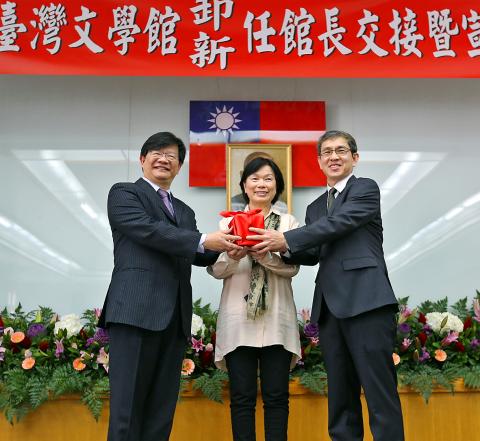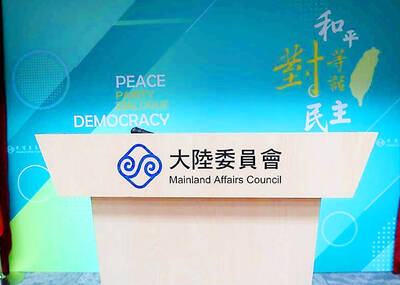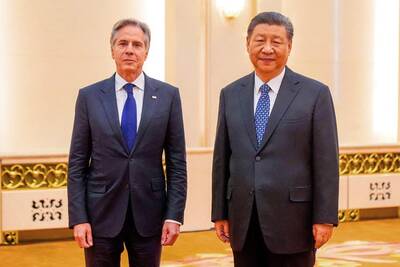Writers and prominent literary figures accused Minister of Culture Lung Ying-tai (龍應台) of making political appointments as executives to head the National Museum of Taiwan Literature (NMTL), after the museum’s new deputy director took up the position on Wednesday.
Lung appointed the museum’s director and deputy director, but neither of them has a related academic background, nor authentic connections to Taiwanese literature studies, they said.
The move led prominent figures in the nation’s literary circles to charge that the museum’s mission statement has been abandoned to become a haven for political appointees and the museum has been turned into Lung’s “personal fiefdom.”

Photo: CNA
National Museum of Taiwan Literature deputy director Hsiao Shu-chen (蕭淑貞) assumed his position this week, while the museum’s director, Weng Chih-tsung (翁誌聰), took up his position in January.
Weng has a doctorate in Chinese literature from the Chu Hai College of Higher Education in Hong Kong and was a senior executive officer of the ministry’s Bureau of Audiovisual and Music Industry Development.
Hsiao, with an academic background in library information studies, was Weng’s subordinate at the bureau, responsible for the popular music division.
Yang Tsui (楊翠), a prominent Taiwanese literature academic, said the appointment of Weng and Hsiao is a slap in the face of the literary community and shows that the museum has lost its direction.
“It shows that this government looks down on Taiwanese literature. There are many people in the literary community with years of administrative experience, but Lung does not want them in charge of the NMTL,” said Yang, whose grandfather is Yang Kui (楊逵), a leading Taiwanese writer best known for two of his books, The Newspaper Boy (送報伕) and The Indomitable Rose (壓不扁的玫瑰花).
When Weng took up his post earlier this year, it stirred up a storm of protest from the literary community. A petition campaign was started at the time to rebuke Lung and critics said that Weng is a stranger to the field of Taiwanese literature, and his appointment was totally inappropriate.
In response, Weng said on Friday that he had to find a new assistant because the museum’s former deputy director had reached retirement age.
“Hsiao was chosen because we worked well together at the Bureau of Audiovisual and Music Industry of Development,” he said.
“When I started in the director’s post I already thought she would be suitable as deputy director. The decision was made after long and serious considerations,” Weng added.
Laiho Culture Foundation chief executive officer Chou Fu-i (周馥儀) said Hsiao’s appointment is extremely questionable because she has no connection to Taiwanese literature.
“We also want to ask Weng, who has now been the museum’s director for half a year, what work programs he has undertaken and what results he has achieved,” she said.
Yang Tsui said one of the two top posts at the museum had always been filled by someone from the Taiwanese literary community, but even if the occupants of these positions are not from the literary community, they should provide evidence of their professional work to convince people that they are suitable for the jobs.
“However, since becoming the director, Weng’s policies and programs still cannot persuade people as to his professionalism and expertise on Taiwanese literature,” she said.
“The National Museum of Taiwan Literature is an important representation and symbol of Taiwanese culture and literature. However, it has now veered far away from Taiwanese literature,” Yang Tsui added.

NO RECIPROCITY: Taipei has called for cross-strait group travel to resume fully, but Beijing is only allowing people from its Fujian Province to travel to Matsu, the MAC said The Mainland Affairs Council (MAC) yesterday criticized an announcement by the Chinese Ministry of Culture and Tourism that it would lift a travel ban to Taiwan only for residents of China’s Fujian Province, saying that the policy does not meet the principles of reciprocity and openness. Chinese Deputy Minister of Culture and Tourism Rao Quan (饒權) yesterday morning told a delegation of Chinese Nationalist Party (KMT) lawmakers in a meeting in Beijing that the ministry would first allow Fujian residents to visit Lienchiang County (Matsu), adding that they would be able to travel to Taiwan proper directly once express ferry

STUMPED: KMT and TPP lawmakers approved a resolution to suspend the rate hike, which the government said was unavoidable in view of rising global energy costs The Ministry of Economic Affairs yesterday said it has a mandate to raise electricity prices as planned after the legislature passed a non-binding resolution along partisan lines to freeze rates. Chinese Nationalist Party (KMT) lawmakers proposed the resolution to suspend the price hike, which passed by a 59-50 vote. The Taiwan People’s Party (TPP) voted with the KMT. Legislative Speaker Han Kuo-yu (韓國瑜) of the KMT said the resolution is a mandate for the “immediate suspension of electricity price hikes” and for the Executive Yuan to review its energy policy and propose supplementary measures. A government-organized electricity price evaluation board in March

MANAGING DIFFERENCES: In a meeting days after the US president signed a massive foreign aid bill, Antony Blinken raised concerns with the Chinese president about Taiwan US Secretary of State Antony Blinken yesterday met with Chinese President Xi Jinping (習近平) and senior Chinese officials, stressing the importance of “responsibly managing” the differences between the US and China as the two sides butt heads over a number of contentious bilateral, regional and global issues, including Taiwan and the South China Sea. Talks between the two sides have increased over the past few months, even as differences have grown. Blinken said he raised concerns with Xi about Taiwan and the South China Sea, along with China’s support for Russia and its invasion of Ukraine, as well as other issues

FAST RELEASE: The council lauded the developer for completing model testing in only four days and releasing a commercial version for use by academia and industry The National Science and Technology Council (NSTC) yesterday released the latest artificial intelligence (AI) language model in traditional Chinese embedded with Taiwanese cultural values. The council launched the Trustworthy AI Dialogue Engine (TAIDE) program in April last year to develop and train traditional Chinese-language models based on LLaMA, the open-source AI language model released by Meta. The program aims to tackle the information bias that is often present in international large-scale language models and take Taiwanese culture and values into consideration, it said. Llama 3-TAIDE-LX-8B-Chat-Alpha1, released yesterday, is the latest large language model in traditional Chinese. It was trained based on Meta’s Llama-3-8B